Entering GoPlus's product matrix, ecological achievements, market scale, and future plans, we take a look at the development opportunities for GoPlus, a well-established security project, in the new market cycle.
Written by: Deep Tide TechFlow
After much anticipation, Eliza has released its technical white paper, sparking widespread study and analysis.
With AI gaining momentum, if the market's understanding of the deep integration of AI and Web3 was previously quite vague, the emergence of this white paper carries profound significance as a "standard setter for AI + Web3."
Among the authors of this white paper, besides Shaw, the founder of ai16z, another familiar yet somewhat unexpected figure has drawn widespread attention: the crypto security infrastructure GoPlus.

In 2024, where memes and AI agents dance together, the market is submerged in a frenzy of high volatility, high risk, and high returns, with new narratives, perspectives, and projects emerging alongside an increasing frequency of rug pulls, malicious schemes, and harmful interaction addresses.
The crypto world resembles a dark forest, where the alarm for asset security is always ringing.
It is precisely for this reason that GoPlus's importance as a major contributor to Eliza's technical white paper is further highlighted:
As a veteran deeply engaged in the crypto security track since 2021, GoPlus introduces professional-grade Web3 security features for AI agents, potentially revealing a new stage in the development of AI agents.
With the TGE approaching, based on the market's deepening security needs, what innovative product breakthroughs will GoPlus bring to the market, further solidifying its important position as a leader in the security field?
This article aims to explore GoPlus's product matrix, ecological achievements, market scale, and future plans, providing an overview of the development opportunities for GoPlus, a well-established security project, in the new market cycle.
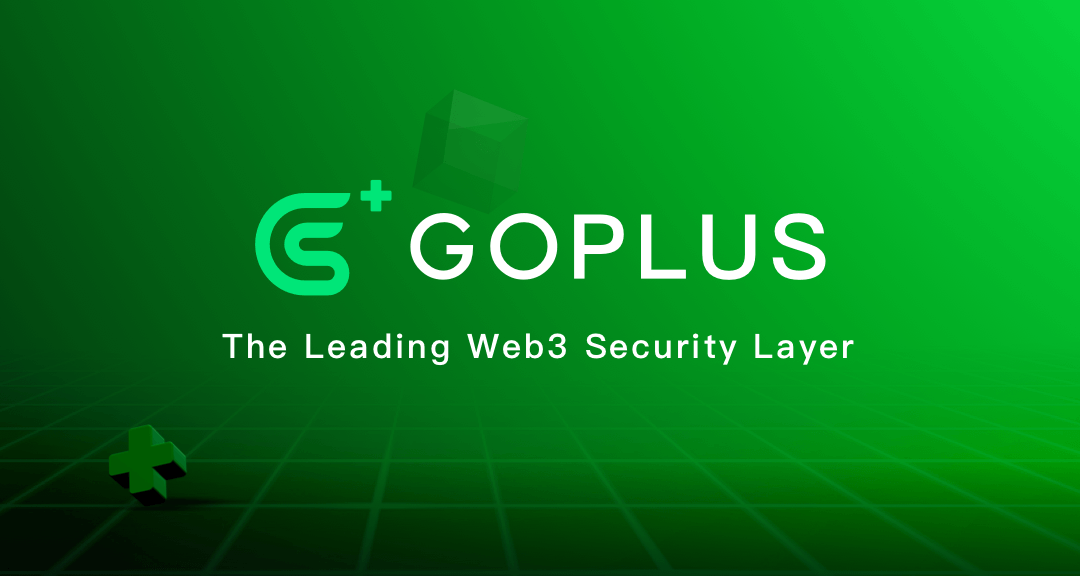
Starting with Eliza: The Pioneer of AI Agent Security Standards and Preferred Partner
As AI technology continues to deeply integrate with blockchain, introducing professional-grade Web3 security features for AI agents is undergoing a paradigm shift from optional to essential.
AI agents, as autonomous decision-making entities, are reshaping the way users interact with the blockchain world. However, as application scenarios continue to expand, the security issues surrounding AI agents are becoming increasingly prominent.
We know that decision-making is a complex logical thinking process, and empowering AI agents with decision-making capabilities will inevitably be influenced by the quality of data fed to the AI, algorithmic biases, and even code vulnerabilities.
In a blockchain environment, AI agents are even more complex, as they not only possess significant asset management and interaction characteristics but also frequently need to interact with various smart contracts and wallet addresses, making trading decisions in a highly dynamic market environment, while facing a more complicated landscape filled with rug pulls, malicious schemes, and harmful interaction addresses.
Especially with the rise of the DeFAI narrative, DeFi, as the core pillar of the crypto world, aims to simplify the complex operational thresholds of DeFi using AI. DeFAI is widely regarded as promising, with multiple AI agents developing automated trading bots in collaboration with DeFi protocols, and projects emerging under the DeFAI narrative. This strong trading attribute leads to an exponential increase in security risks; once a security issue occurs, the losses can be immeasurable, making more people aware of the critical importance of security for the healthy and prosperous development of AI agents.
From this perspective, GoPlus's deep involvement in the writing of the Eliza technical white paper further highlights its forward-thinking approach in vying to become the "preferred partner for AI agents."
From a functional standpoint, GoPlus can provide AI agents with key services, including potential risk and vulnerability analysis of token contracts, malicious website identification, scam signature recognition, risk smart contract approval alerts, and malicious address detection, thereby solidifying the security baseline in all aspects of AI agent interactions.
Just two weeks ago, the GoPlus security plugin was officially integrated into the ElizaOS security module, becoming a key middleware for AI agents interacting with over 30 public chains.
At the same time, GoPlus announced a formal partnership with Phala Network to jointly advance the TEE program and the security model analysis and auditing framework for AI, which will greatly enhance the verifiability and security of AI agents. The Eliza + Tee + Security puzzle is in place, catalyzing the accelerated arrival of AI Agent Summer.
This collaboration between the leading security track and the leading AI agent track provides a pioneering demonstration of how AI agents can introduce professional-grade Web3 security features as a foundational security guarantee.
As a major contributor to the Eliza technical white paper, GoPlus has conducted extensive and in-depth research on AI agents over the past few months. With the release of the Eliza technical white paper, GoPlus has become a pioneer and rule-maker in AI agent security standards.
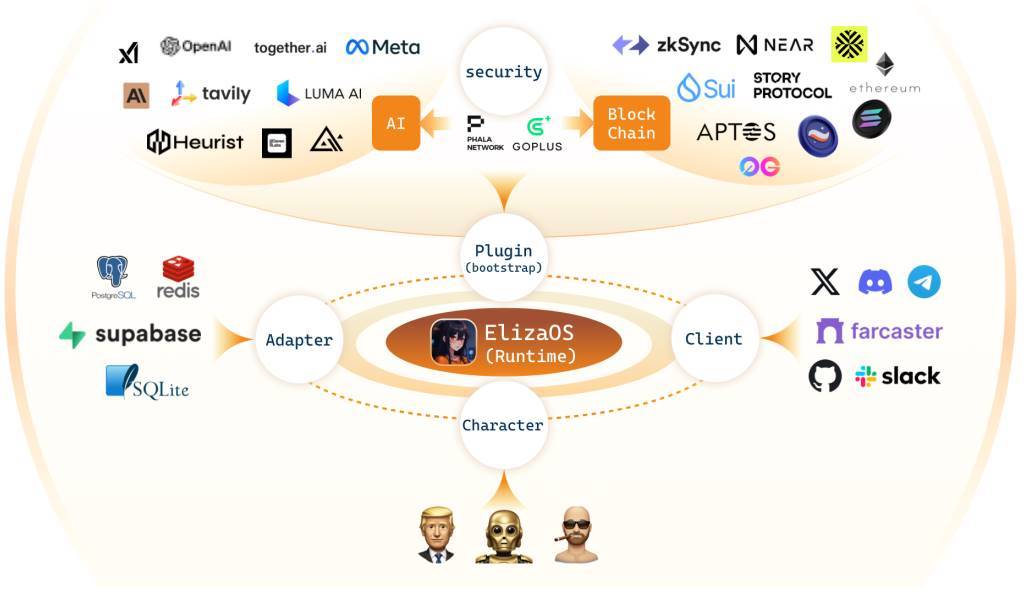
It is reported that GoPlus's exemplary collaboration with ai16z has further clarified the security needs of the AI agent track. Currently, more than dozens of AI agent projects are rapidly seeking cooperation with GoPlus, further expanding the coverage of professional-grade Web3 security features in the AI agent track.
With its first-mover advantage, GoPlus has already become the preferred partner for AI agents.
This first-mover advantage stems from GoPlus's strong foundation as a well-established security project, with solid technical expertise resulting in a mature product matrix that better aligns with the development needs of AI agents. Additionally, the broad market recognition gained from years of practical security experience allows GoPlus to better understand the next stage of market demand.
Covering over 90% of on-chain transactions: A crypto security leader valued at over $100 million
In the crypto forest, dangers lurk everywhere, and security is the foundation of the crypto economy, the importance of which is beyond doubt. With the vast market scale established through rapid development over the past three years, coupled with the widespread discussion sparked by the GoPlus token GPS TGE, when discussing security projects in the current crypto field, GoPlus is trending towards being a name recognized by all.
From a vertical perspective on GoPlus's depth of crypto security services, you will find that whether it is from the subtle promotion of security knowledge, the detection of malicious addresses before transactions, risk transaction enhancements, anti-fraud, anti-phishing, and anti-MEV during transactions, to asset recovery after transactions, GoPlus is committed to providing comprehensive one-stop security services for crypto users across different stages of the transaction lifecycle.
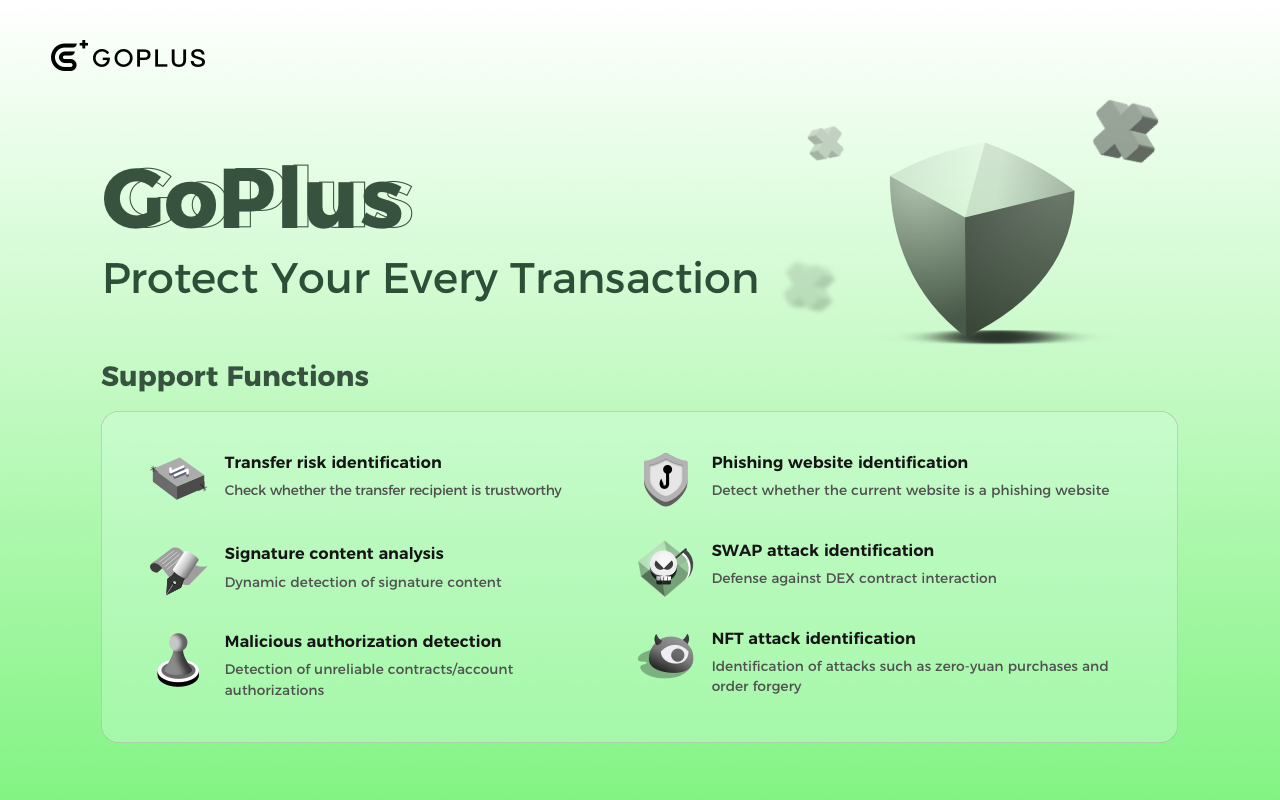
From a horizontal perspective on GoPlus's breadth of crypto security services, due to GoPlus's extensive integration, many users are surprised to find that, unbeknownst to them, they are already deep users of GoPlus's security services.
Currently, GoPlus supports over 30 mainstream public chains, including Ethereum, Solana, BNB Chain, Base, and Sui, and has established deep partnerships with over 10,000 partners, including many well-known projects such as Trust Wallet, Gecko Terminal, CoinMarketCap, OKX Wallet, Bybit, DexScreener, Dextools, and SushiSwap. Through extensive collaborative integration, GoPlus's powerful security services reach tens of millions of crypto users.
According to service call data, GoPlus has indeed built an impenetrable security barrier for users on-chain: official data shows that GoPlus averages over 34 million calls per day, with a cumulative total of over 4 billion calls, achieving an astonishing on-chain transaction coverage rate of 90%. This means that more than 90 out of every 100 on-chain transactions are safeguarded by GoPlus.
At the same time, GoPlus's open security application platform has served over 12 million on-chain users, fully demonstrating GoPlus's market influence as a leader in crypto security.
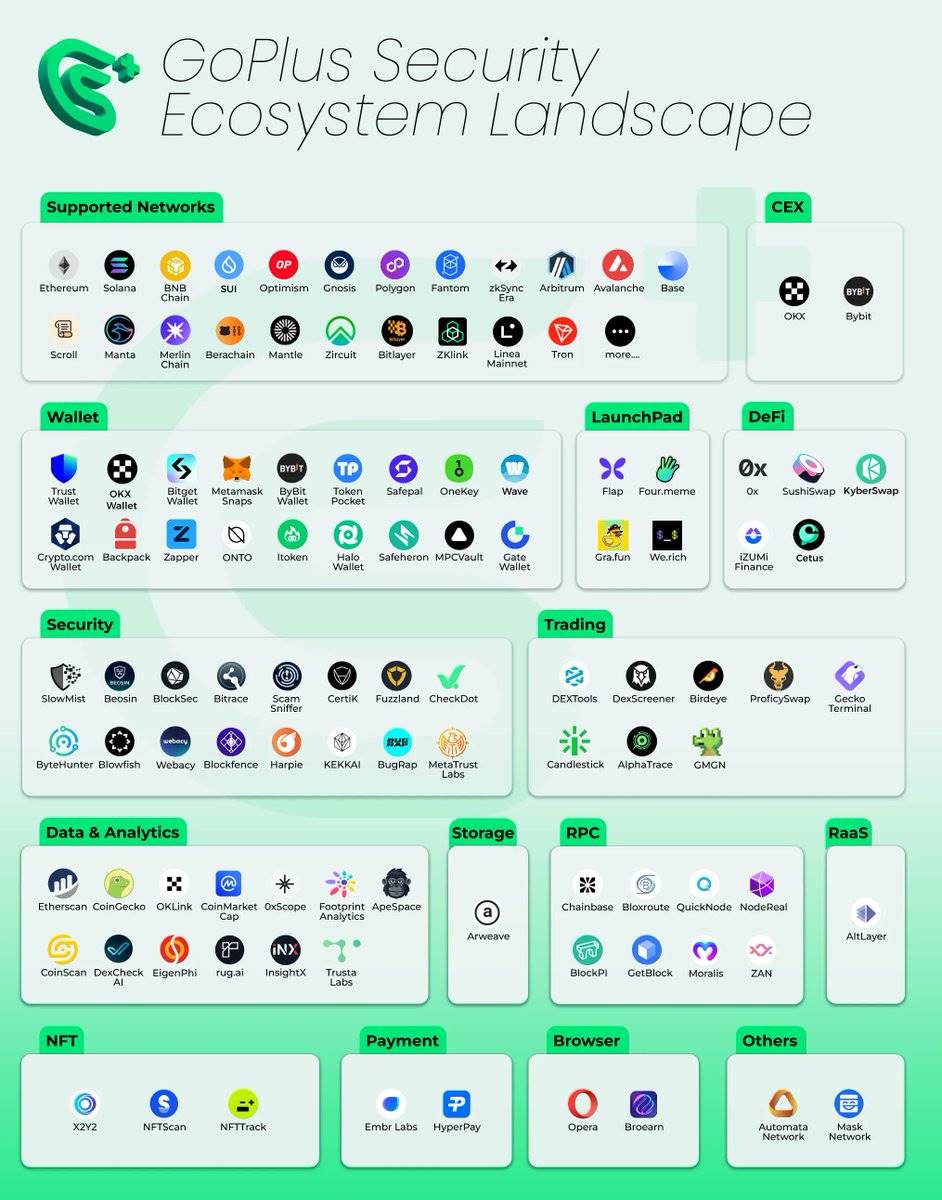
The data from the market dimension is impressive, and the performance in the capital market is also remarkable.
According to publicly available information from RootData, GoPlus has completed five rounds of financing to date. Although specific financing amounts have not been disclosed for some rounds, by aggregating content released by major media outlets, GoPlus's cumulative financing amount currently exceeds $25 million.
In terms of valuation, we can see that in the second round of private financing conducted in December 2022, GoPlus was valued at $150 million. Subsequently, GoPlus completed two additional rounds of financing totaling $14 million, and the project's valuation is expected to further expand. Based on current information, many institutions and KOLs estimate that GoPlus's FDV after listing will be around $500 million to $1 billion.
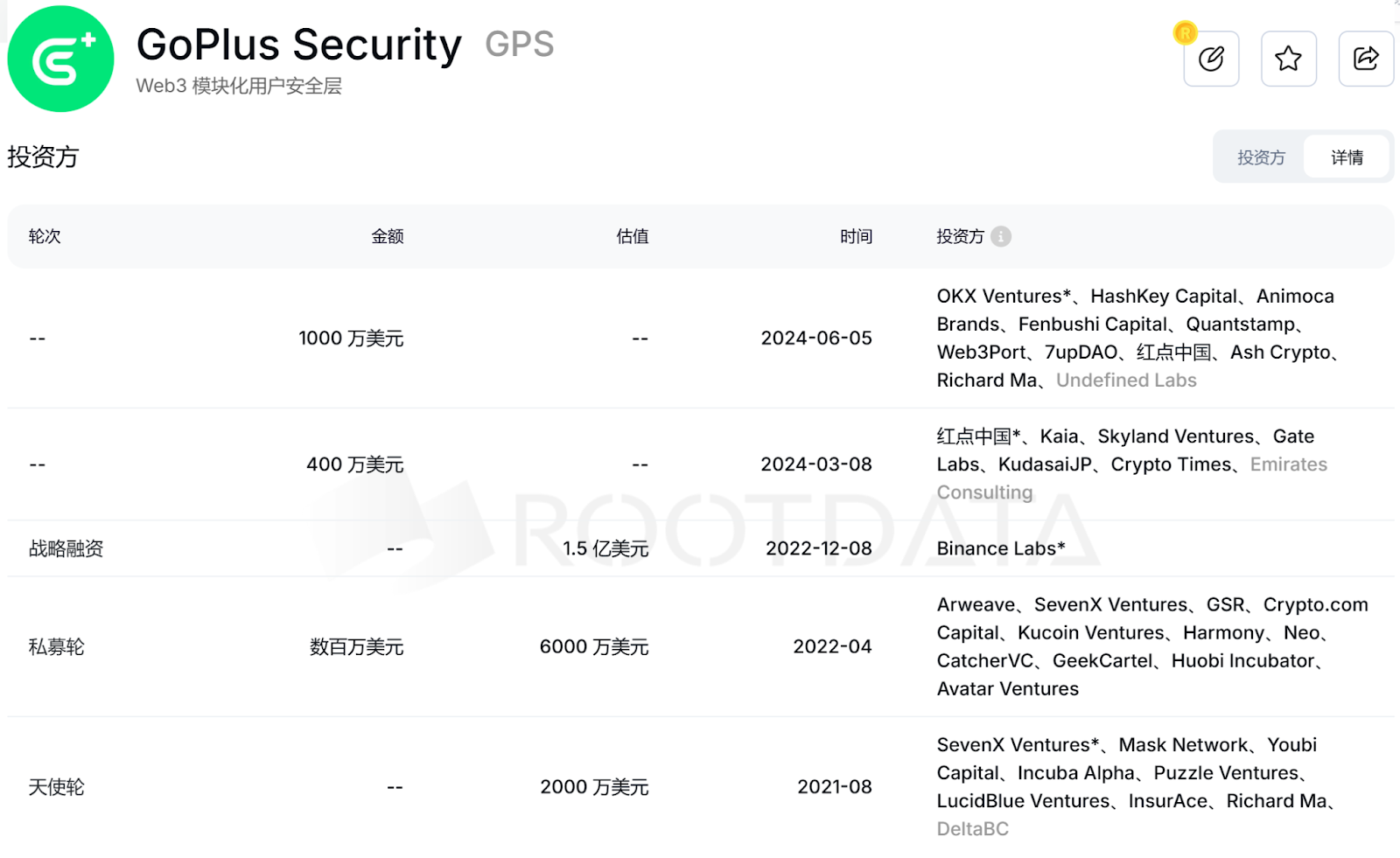
It is worth noting that among the top institutions such as HashKey Capital and Animoca Brands showing favor towards GoPlus, the support from the two leading exchanges, Binance and OKX, is particularly noteworthy: Binance Labs participated as the lead investor in GoPlus's strategic financing in December 2022; Binance Labs led the investment; OKX Ventures also participated as the lead investor in GoPlus's latest round of financing in June 2024.
We know that in 2025, with crypto-friendly President Trump taking office and MicroStrategy leading traditional institutions into Web3, the crypto market will enter a key period of rapid development, and security, as an essential need, will naturally rise.
In this broader context, Binance and OKX, as absolute leaders in the Chinese and even global exchange arena, will certainly not overlook the layout in the security sector.
GoPlus, as the intersection where the two top exchanges bet on the security sector, not only demonstrates institutional recognition of the project's service and development potential but also, backed by the strong user, ecosystem, and financial resources of top exchanges, will maintain its growth momentum and further enhance its market share in the future.
At the same time, as the token is key to energizing the ecosystem, the arrival of the GPS TGE will not only promote GoPlus's vision of a modular security layer but also focus industry attention, attracting more users, developers, and projects to participate, further elevating the community's optimistic expectations for GoPlus's future development as a leader in crypto security.
Of course, whether it is capital favor or user choice, the ultimate focus is on product quality. By building a complete product matrix with the vision of a modular security layer, GoPlus has meticulously woven a comprehensive and dense security protection net that has already entered thousands of households in the crypto market.
Modular Security Layer Builds a Comprehensive Defense for Web3, 2B2C Constructs a Revenue Flywheel
If you understand the definition of "layer," then you can easily grasp the security barrier that GoPlus constructs for users, developers, and every relevant role in the crypto world, following a bottom-up logic.
Overall, the GoPlus modular security layer is divided into three layers:
The bottom layer is the Fundamental Layers, namely GoPlus Network.
As the foundational base of the GoPlus security system, GoPlus Network has two core templates: the security data layer and the security computing layer. The security data layer collects, processes, and stores security-related data in a decentralized manner to ensure the integrity, authenticity, and reliability of the data; the security computing layer is responsible for executing security-related computations and verifications through multiple distributed nodes.
The Fundamental Layers aim to ensure the security and robustness of the GoPlus network itself while attracting more developers to co-build a secure ecosystem without permission.
The middle layer is the SecWare Ecosystem, namely SecWare.
The SecWare Protocol is the core of the SecWare ecosystem, aiming to build security services based on the Fundamental Layers to meet the different security needs of upper-layer users during transactions, such as anti-fraud, anti-phishing, and anti-MEV. Developers can create SecWare instances by registering their security services on the SecWare Protocol for users to purchase and use.
The revenue generated from purchases is pooled into a revenue pool, and rewards are allocated to developers based on their SecWare usage and performance. To ensure that developers create high-quality solutions, they must also stake a certain amount of tokens when creating SecWare instances.
The top layer is the Network Service Entrance, namely USM (User Security Module).
USM is presented in the form of an SDK, aiming to easily integrate GoPlus's security capabilities into dApps, wallets, RPCs, and chains, providing comprehensive security services for every transaction, including pre-transaction risk monitoring, risk interception during transactions, and post-transaction residual risk analysis.
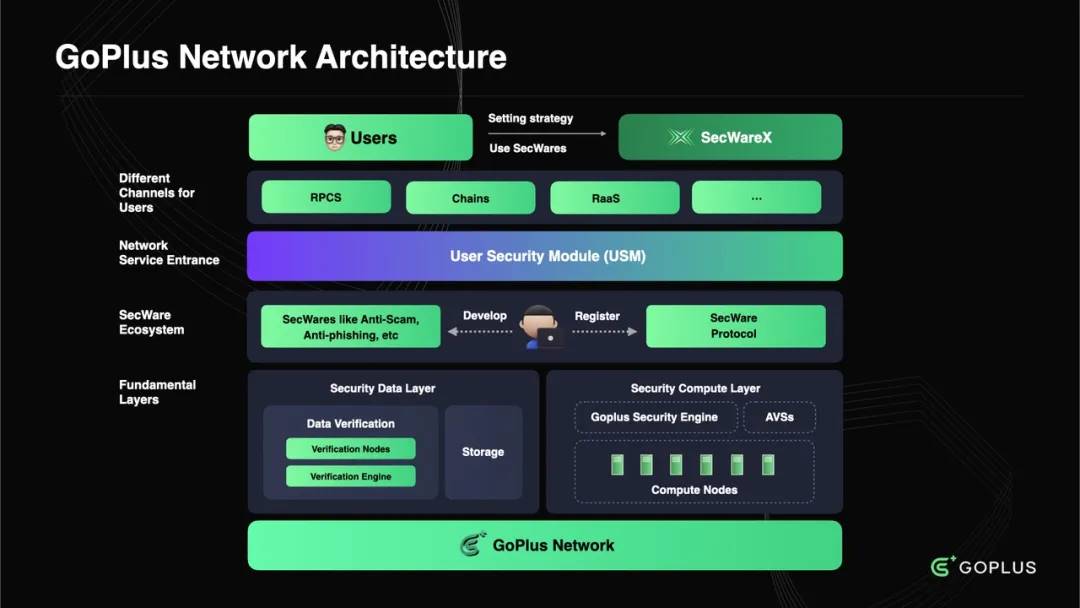
Once the framework is established, a healthy ecosystem must also possess openness and allow every participant to benefit, and GoPlus understands this well.
In the Fundamental Layers, the security data layer supports third parties to provide security-related data, while the security computing layer introduces a staking mechanism and supports EigenLayer-based AVS as third-party participants, further enhancing the credibility of the computation results.
The flagship product built on the SecWare Protocol, the GoPlus APP, speaks for itself: it features a multi-chain wallet scanner, personal security center, SecWare marketplace, and security task center, enabling security developers to create customized security solutions for over 100 Web3 security scenarios, while users can access, manage, and customize these security solutions through a dedicated management dashboard called Personal SecHub.
GoPlus has also launched SecNet, allowing users to directly access the powerful security features of the GoPlus network by connecting to the SecNet RPC endpoint without prior deployment.
The SafeToken Protocol is another highly discussed product in the community, dedicated to providing guarantees in token issuance, liquidity management, and security prevention. It is currently widely integrated across multiple LaunchPad platforms, including Four.meme, Flap, and We.Rich.
Additionally, addressing the often-overlooked C-end users in the security sector, GoPlus has launched a browser security plugin that integrates five core functions: wallet security inspection, proactive pop-up warnings, transaction environment custom detection, AI Bot, and security to-do list. It supports real-time risk detection for seven public chains, including Ethereum, BNB Chain, and Solana, alerting users to common Web3 security threats such as phishing attacks and interactions with blacklisted addresses. Since its launch on November 27, 2024, the download count has exceeded 200,000 in less than two months.
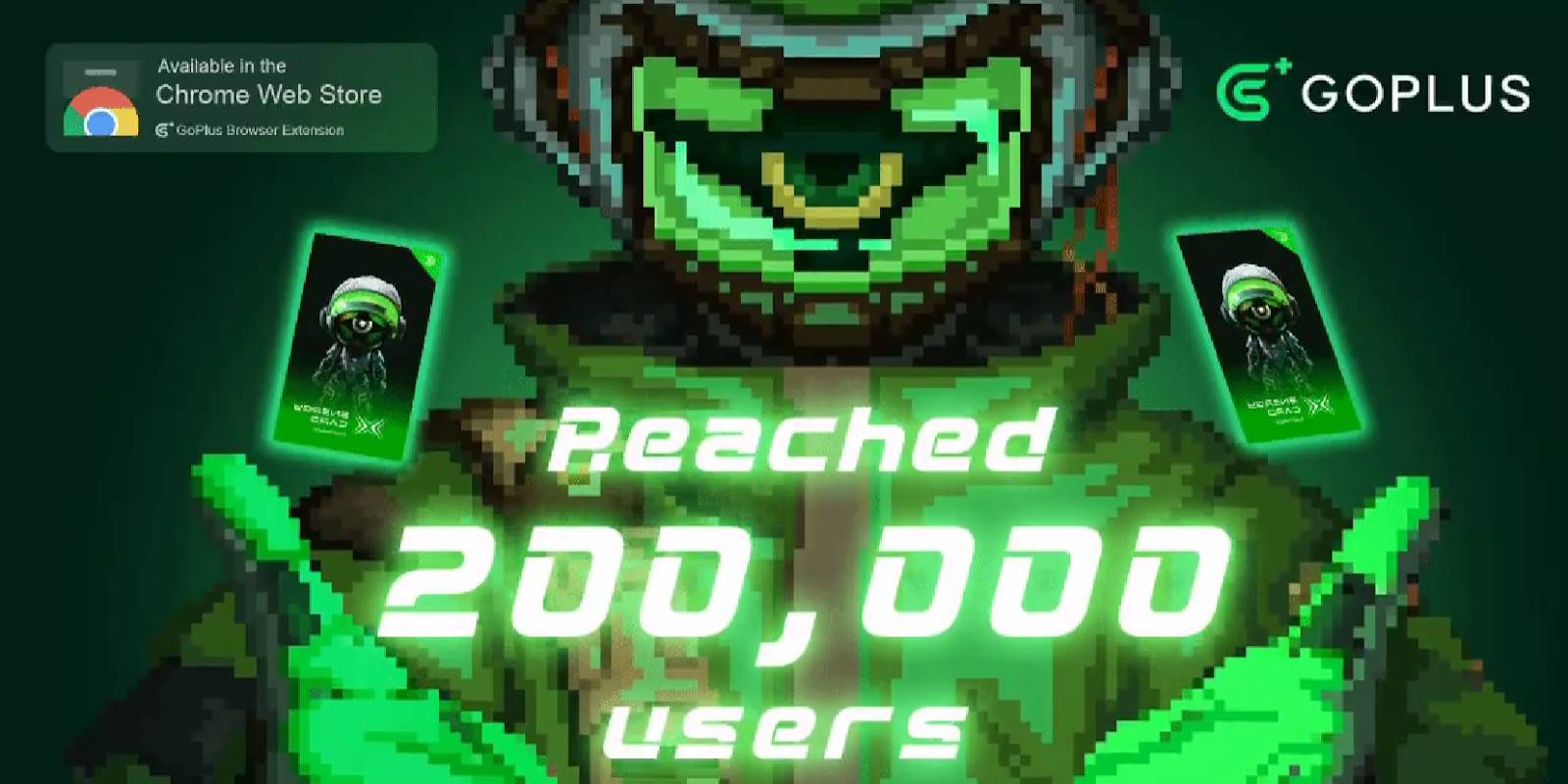
This inclusivity of the ecosystem, catering to both B-end and C-end users, attracts more and more users and developers to join, continuously uncovering and precisely identifying and meeting security needs, thus providing a strong revenue source for the underlying support of the GoPlus Network.
The subscription fees for security services in the GoPlus APP are the most direct and substantial source of income for the GoPlus Network. According to official data, the current monthly active unique IP users of the GoPlus APP reach 2 million, with over 70,000 users subscribing to premium security services, generating over 2.5 million USDT in cash flow income.
In addition, GoPlus serves over 10,000 partners and tens of millions of users, and further income will be generated through products like the SafeToken Protocol and paid APIs/SDKs.
Moreover, in the design of the ecological economic model, GoPlus has also introduced gas fees integrated with USM and the blockchain, using GPS tokens and energy blocks as gas for security services. Based on GoPlus's current ecosystem scale, user base, and on-chain activity, this will also become a significant source of ecological revenue. With the community's keen attention on the GPS token TGE, more users, developers, and projects will join, further enhancing GoPlus's revenue capabilities and driving the GoPlus ecosystem flywheel to spin rapidly.
GPS TGE Sparks Attention, AI Agent Security Intelligence Detection Coming Soon
Following the official announcement of the TGE on January 16, 2025, and the opening of airdrop claims at 15:00 on the same day, community enthusiasm has been further ignited. It is reported that over 500,000 wallet addresses have claimed so far.
According to the airdrop details released on January 15, the total issuance of GPS tokens is 10 billion, of which 10% is allocated for early participant airdrops, which will be conducted in four seasons, with a total release of 3% in the first season. The first season airdrop eligibility covers five types of users: Energy Block miners, Energy Card holders, paid service users, browser plugin users, and security service partners. More than 1.04 million eligible addresses will receive GoFam SBT, unlocking additional rights for the next season's airdrop.
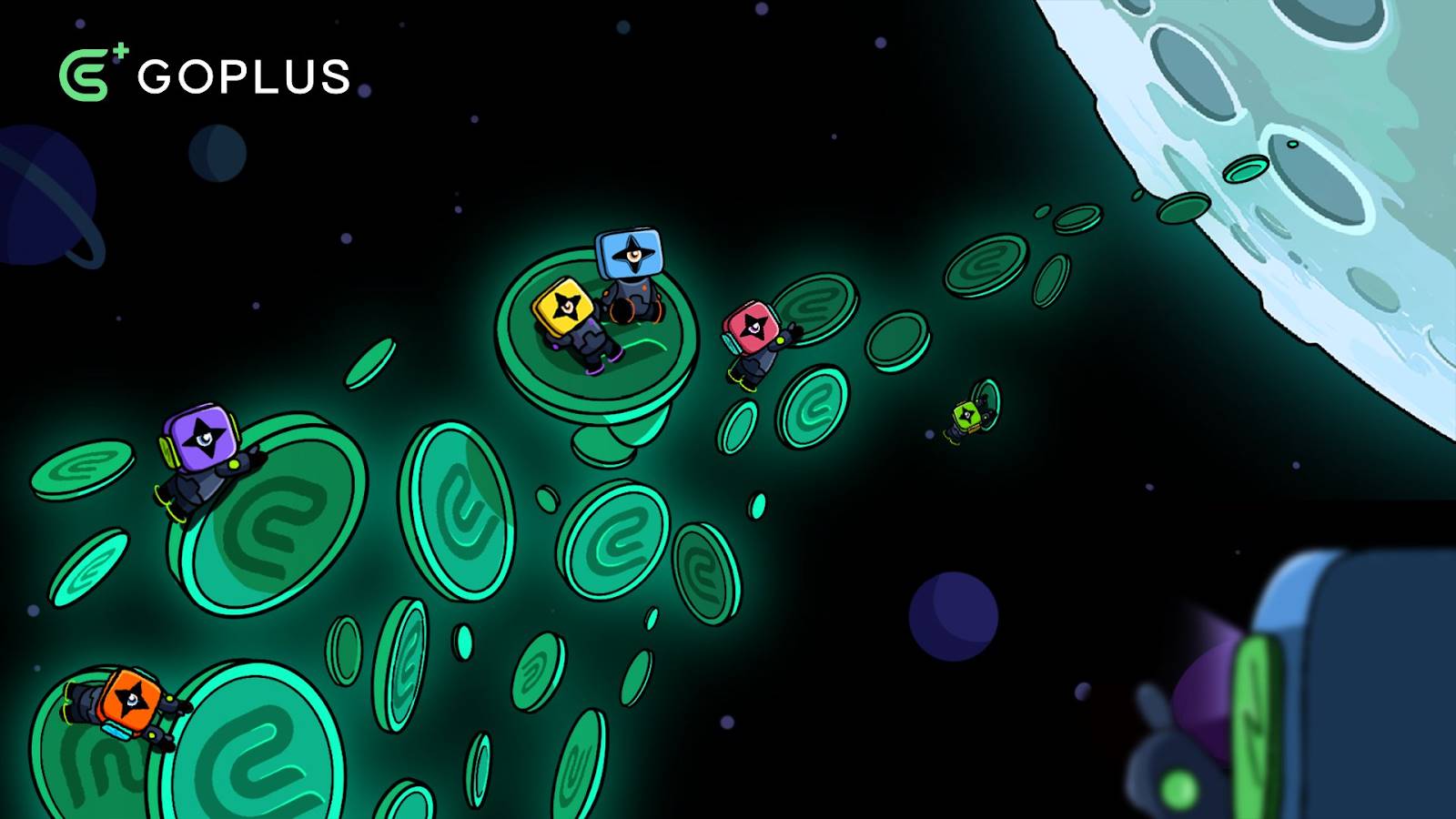
As a milestone for the project at the beginning of 2025, the official launch of the GPS token is seen as an important turning point for GoPlus, upgrading from a single security service provider to an open, permissionless, transparent, user-driven decentralized security network that benefits everyone. As a modular security layer, GoPlus is committed to providing comprehensive protection for the entire Web3 security lifecycle, including secure asset issuance, secure asset management, and secure transactions, with the GPS token being the core that connects all these services.
Specifically, in terms of endowing the GPS token with utility, GoPlus has made intricate designs covering multiple application scenarios:
On one hand, the GPS token serves as a vehicle for ecological incentives and governance. By contributing to the network, interacting with product experiences, and actively participating in community activities, ecological participants can earn GPS token rewards. Additionally, holding GPS tokens allows participation in ecological governance.
On the other hand, when users experience transaction protection services, access security intelligence, or use the SafeToken protocol for liquidity management, the GPS token can be used for gas and fee payments.
Furthermore, GoPlus has introduced staking mining, requiring ecosystem contributors to stake GPS tokens to become security service computing nodes or security data providers.
Regarding the token distribution mechanism, which the community is very concerned about, GoPlus has chosen to allocate 60.67% of the token supply to the ecosystem. Additionally, a 1-year lock-up period and a 3-year linear unlock have been introduced for the team and early investors, demonstrating GoPlus's confidence and commitment to the long-term development of the project. The specific token distribution is as follows:
24.67% Community Development and Incentives
10% Ecosystem Growth
10% Community Airdrop
7% Liquidity Support
6% Marketing
3% Advisor Support
20% Core Team
19.33% Early Investors
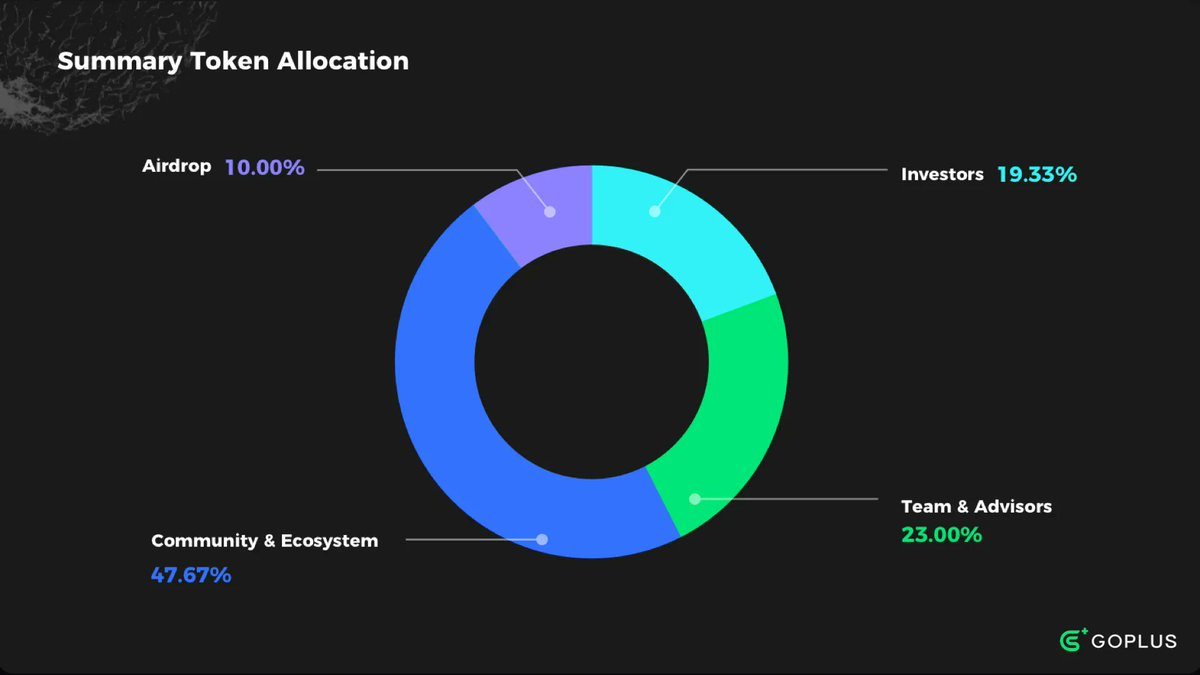
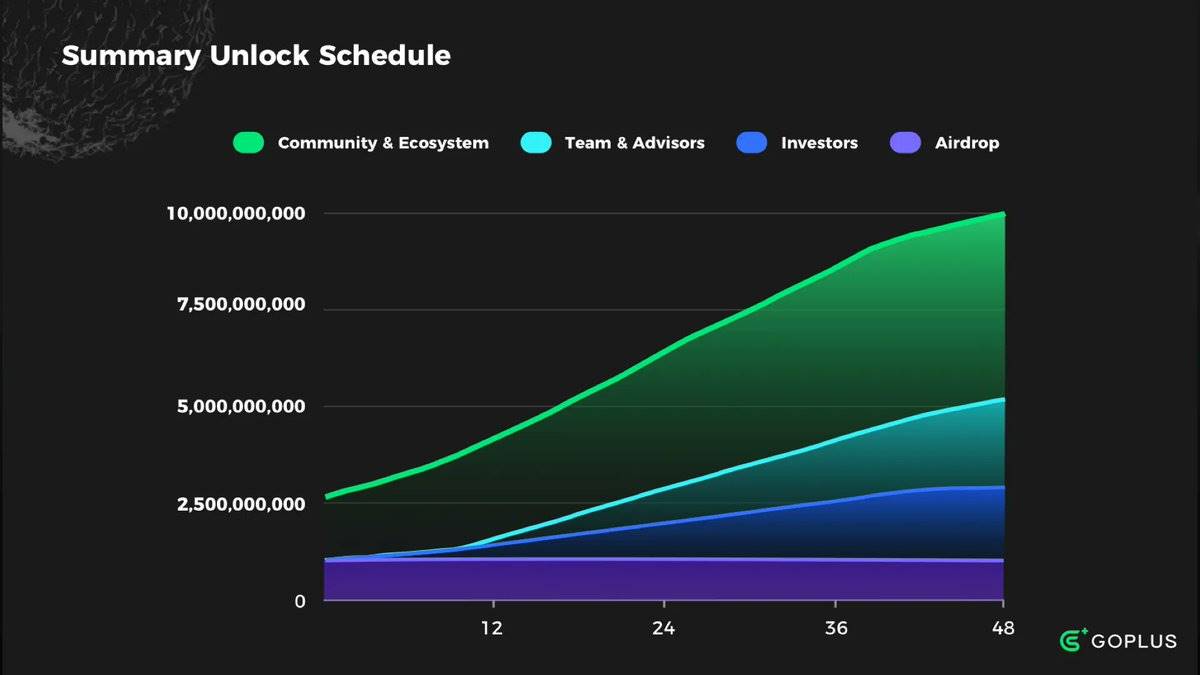
In addition to the TGE, GoPlus's various initiatives are also progressing in an orderly manner, with multiple roadmaps set to be unveiled soon.
On one hand, GoPlus will continue to delve into the AI field, not only engaging in deep cooperation with more AI Agent projects but also launching a product specifically tailored for AI Agent security, the AI Agent Security Intelligence. This product will leverage AI Agent security analysis capabilities to help users identify risky AI Agents.
On the other hand, with the official launch of the GPS token, GoPlus will also initiate the Security Gas Fee program, allowing GPS tokens to be used to pay for security service fees applicable to every transaction, further enhancing the utility of the token while promoting the robust development of GoPlus's decentralized security ecosystem.
Additionally, in the technical realm, GoPlus is pushing for partial open-sourcing of its security engine to further open up the developer platform and Playground, encouraging broad community participation and innovative development, injecting more growth vitality into the ecosystem.
Conclusion
The crypto world resembles a dark forest, where mature traders understand the truth that "preserving wealth is as important as capturing wealth." Therefore, security is a perennial topic in the crypto industry and an indispensable part of the healthy development of the crypto market. However, due to its underlying infrastructure nature, it has never been a particularly eye-catching presence.
Yet, with GoPlus, we see not only its outstanding achievements in safeguarding user asset security but also its ability to make security narratives appealing by focusing on security as a foundational narrative and leveraging AI Agents as a hot topic. This has led to the development of a series of mature products aimed at both B-end and C-end users, with AI Agents moving towards standardized security development.
With the arrival of the TGE, combined with the momentum of the AI Agent craze and the acceleration of various milestones to realize GoPlus's vision of a modular user security layer, we look forward to GoPlus's continued ability to impress, bringing more practical and innovative product innovations to the market and further solidifying its important position as a leader in the security field.
免责声明:本文章仅代表作者个人观点,不代表本平台的立场和观点。本文章仅供信息分享,不构成对任何人的任何投资建议。用户与作者之间的任何争议,与本平台无关。如网页中刊载的文章或图片涉及侵权,请提供相关的权利证明和身份证明发送邮件到support@aicoin.com,本平台相关工作人员将会进行核查。




